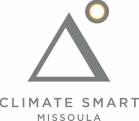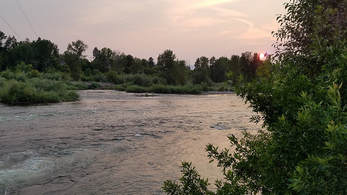 Summer smoky skies along the Clark Fork in Missoula. (Photo: Abby Huseth) Summer smoky skies along the Clark Fork in Missoula. (Photo: Abby Huseth) Call me biased, but our monthly meetups are pretty great. I think you’d be hard pressed to find a more interesting and wide-ranging conversation anywhere in town. Where else can you talk about pumped hydro energy storage technology, the virtues of lentil farming, the perils of human urine, and industrial-scale composting, all in the span of an hour and a half? If you couldn’t tell, the common thread running through these subjects is water – more specifically, the implications of climate change when it comes to our rivers, our drinking water, and our wastewater. That was the theme on tap for our August 2, 2018 monthly meetup - here's a recap of our conversation. Our Rivers Alex and Katie from the Clark Fork Coalition joined us to talk about what they’re seeing along the Clark Fork, here in town but also throughout our larger watershed. Alex was one of the authors of the Montana Climate Assessment, so he knows his stuff. CFC measures water all over the river, and this year there was a record snowpack in the upper Clark Fork, and a fairly wet spring. But this July was also the second driest on record – which, sure enough, was what the MT Climate Assessment predicted. Despite this lack of rainfall, we’re still seeing decent flow levels and relatively cooler water temperatures all along the Clark Fork because of something you might not have guessed: groundwater. In fact, we learned that 90% (!) of a watershed’s waterflow is actually underground. Whoa. So despite the trend of more spring precipitation and longer droughts in our region, the snowpack and rain may end up boosting the “natural storage” capacity of the watershed. That might sound good, but we’re definitely not out of the woods climate-wise when it comes to our rivers. Hotter temperatures mean higher rates of evapotranspiration, thus plants need more water to grow. More study is needed on what this means for the long-term evolution of our forest ecology. Alex reminded us that 95% of our state’s water use is due to agriculture. This is where we wade into the complicated realm of water rights and Helena lobbying interests, and then wade right back out again, because we could really get stuck there. Suffice to say, even when a rancher wants to return their water right to in-stream, it’s super hard to do. And most of the agriculture in our state is low-value commodity ag, so it’s hard to economically justify efforts to conserve water. What we could really use is more lentils! No, seriously – legumes and other dry-farmed products are a growing sector of Montana agriculture, which is pretty cool, and water smart. (Check out the Lentil Underground!) Ok, one last interesting issue at the nexus of water and climate that I hadn’t considered before. Katie from CFC talked about their recent studies on recreation on the Clark Fork river. As we experience more heat waves during the summer, more and more people are using the river to cool down. On one hand, dunking in the river is better than cranking the A/C. But in addition to bumper-to-bumper tube traffic on certain sections of the river, more river recreators means streambank erosion, more trash, and an overabundance of human urine. Yep. So it’s possible that we might we need more official river access points…with port-a-pottys. Thanks, climate change!
Avoiding overwatering outdoors is important too (those subdivided ranchettes with giant lawns don’t help...), but by all means keep your veggie patch green and water your trees - we need them to keep our city cool! If you’ve ever wondered about graywater systems (where water from sinks and laundry is recycled, either to flush toilets or for irrigation), they are allowed here but you’ll want to read up on the rules and regulations. 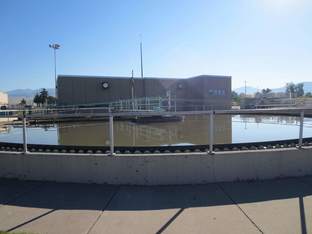 A primary treatment pond at the WWTP where most of the bio-waste settles before it is dewatered and composted. (Photo: Mattie Lehman) A primary treatment pond at the WWTP where most of the bio-waste settles before it is dewatered and composted. (Photo: Mattie Lehman) Our Wastewater Treatment Plant Rocks! So, what about that last piece of the water+energy puzzle – the treatment of our sewage and wastewater? Turns out, our humble little municipal wastewater treatment plant is light years ahead of most facilities around the country! Our intern Mattie shared what she recently learned on a tour, which was that there’s resource recovery happening with all three different waste streams created by the plant: the bio-solids (solid waste), the effluent (liquid waste), and methane gas. The City-owned Garden City Compost, right next door, accepts treated bio-solids, which are then turned into compost that’s available for sale, as well as used on the neighboring plantation of poplar trees. The poplar plantation is also a destination for a large volume of the effluent. The trees and soil filter the effluent before it returns to the aquifer, and the nutrients benefit the fast-growing trees, which can then be harvested in succession and sold for wood products. And if that wasn’t enough, the wastewater treatment plant also recently put a new methane cogeneration plant online. This dual technology recovers lost heat as well as generates electricity from the recaptured methane – covering 25% of the plant’s usage at peak! All of these sustainable elements reduce the impact of the resource-intensive process needed to get wastewater to meet the high standards for discharge back into the river, and mean that ultimately less has to get discharged. (Mattie's been working on a "Storymap" project highlighting this story as well as other "energy stories" around town - we're looking forward to sharing her great work soon. In the meantime, check out this handy infographic on the WWTP resource recovery efforts that she created.) Water, Climate, and Missoula’s Future
As our climate changes and our population here grows, keeping our rivers cool and plentiful for fish and humans, and conserving water and the energy embedded in it will be more and more critical. We’re grateful for the visionary and hard work of the Clark Fork Coalition, our Wastewater Treatment Plant staff, Missoula Water, Garden City Compost, and so many more great organizations that maintain this resource which is so important to our identity as Missoulians as well as to building climate resilience for a hotter, drier future that is already here. Join us next month for our September meetup on Renewable Energy! Thursday, September 6th, 5-7pm at Imagine Nation as usual. Snacks, tasty beverages, and good conversation guaranteed! -Abby Huseth
1 Comment
|
AuthorsAbby Huseth Archives
July 2024
Categories
All
|
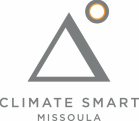
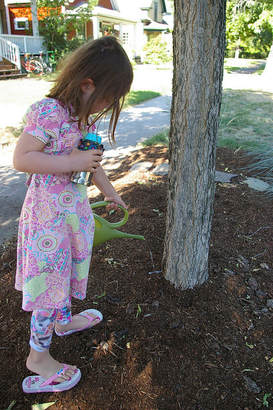
 RSS Feed
RSS Feed


